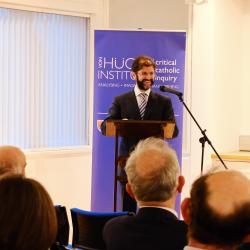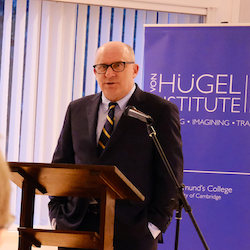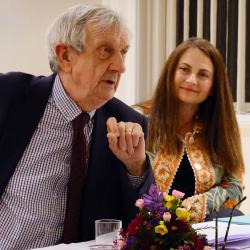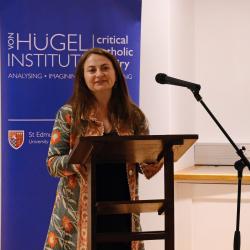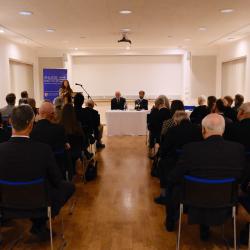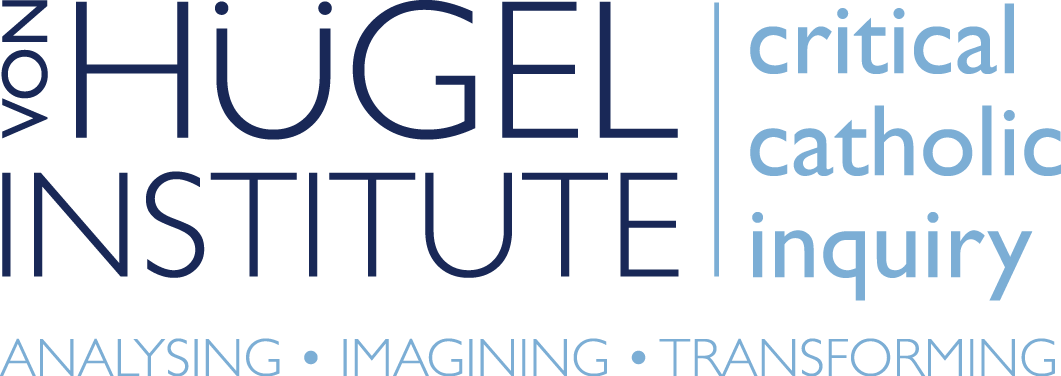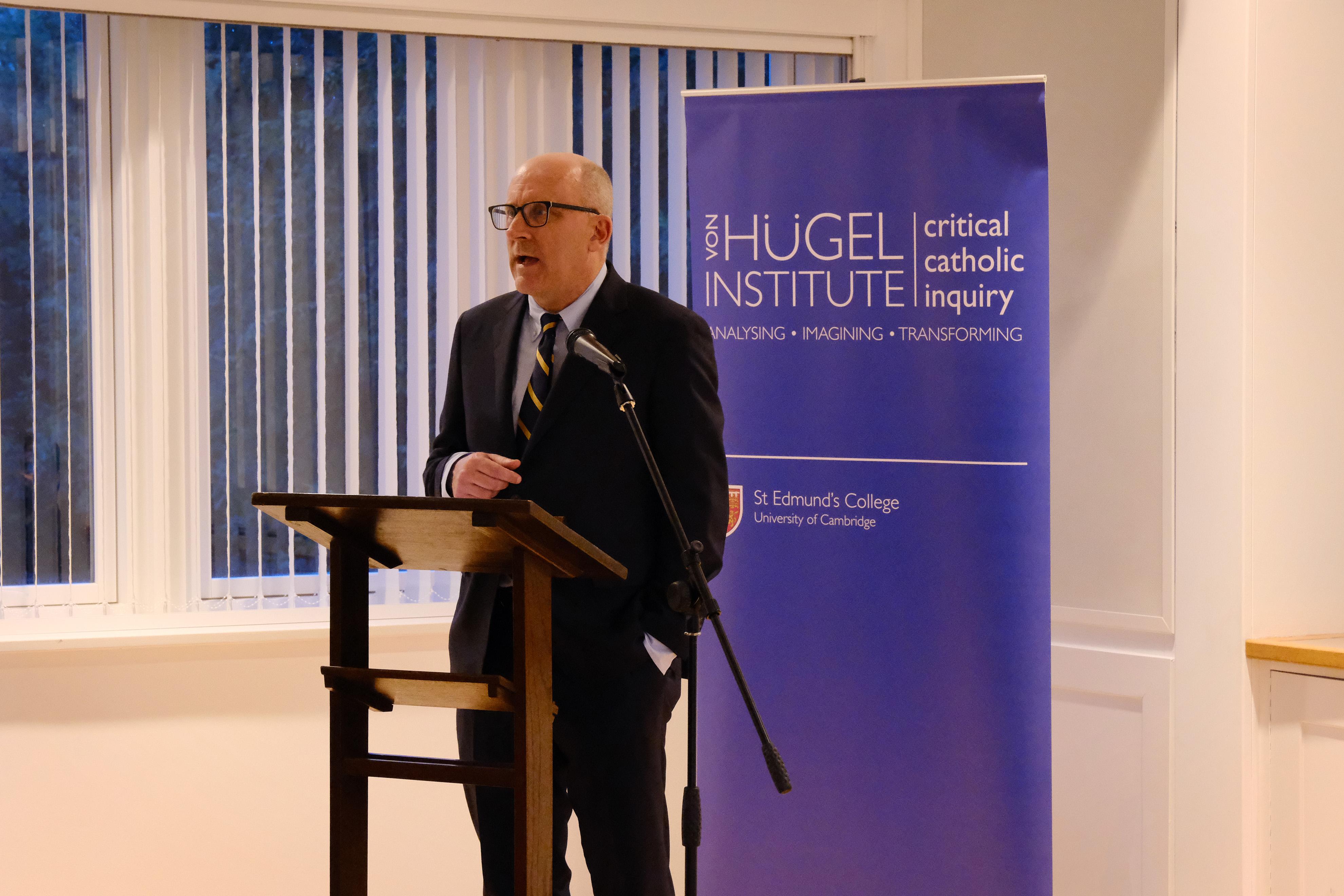
On Monday, 13 March, the Von Hügel Institute for Critical Catholic Inquiry and St Edmund’s College welcomed Professor John T McGreevy, Provost of the University of Notre Dame, to present his latest book, Catholicism: A Global History from the French Revolution to Pope Francis. McGreevy first visited the Von Hügel Institute in 2019, as part of the Institute’s Catholicity: Crises and Opportunities? series, to deliver a lecture on ‘Catholicity and History’.
McGreevy’s book presentation, chaired by the Director of the Von Hügel Institute for Critical Catholic Inquiry, Dr Vittorio Montemaggi, included responses by renowned historian Professor Eamon Duffy FBA and the Master of St Edmund's College, Catherine Arnold OBE.
“The history I sketch [in this book],” said McGreevy, “[demonstrates] a church marked by unprecedented vibrancy, concern for social justice, and global connection. In much of the world, including the United States and England, the number of observant Catholics is shrinking...The structures built in the nineteenth and twentieth centuries barely stand…The sexual abuse crisis has taken an incalculable toll, on survivors above all, but also on the credibility of Catholic institutions and the people who run them."
McGreevy concluded his presentation by articulating opportunities for institutions of Higher Education today:
"[A] mixture of vibrancy and turmoil has consequences for the work we do together at Notre Dame and St Edmund’s...Our shared good fortune means we have an opportunity, maybe responsibility, to confront the challenges we all now face…Catholicism as an institution will be reimagined in the twenty-first century…[and] both St Edmund’s and Notre Dame—maybe the people in this room—will play an important role in that reimagining."
The first response, offered by Duffy, praised the extensive scholarship and careful balance achieved by McGreevy in his most recent historical survey.
“One of the most welcome aspects of Professor McGreevy’s splendidly learned and wide-ranging book,” said Duffy, “is its demonstration…of the complexity and multi-vocal character of Catholicism since the French revolution."
"[McGreevy’s] extraordinarily wide-ranging survey…has much to say about the histories of Catholicism in North and South America, but also in Africa and Asia, most of it material largely unfamiliar to British readers," he noted.
"Proponents of authoritarian and monolithic accounts of Catholicism routinely appeal to the past, and to tradition, imagined as a seamless homogenous whole, to underpin a vision of Catholicism that flattens difference and projects on to the past… an oppressive uniformity...It’s one of the perennial tasks of the Church historian to complicate and contradict any such exercise in over-simplification…[and] Catholicism: A Global History…admirably fulfils that honourable vocation."
A second response, offered by Arnold, outlined how St Edmund’s College fits within the larger historical narrative woven by McGreevy and, particularly, how St Edmund’s and Notre Dame are situated within their distinctive histories to answer a unique call to action.
"Our Royal Charter of 1998, which underpins our existence as a College, clearly states that among the College’s objects is: to promote and facilitate contributions from the Catholic Church and from members of the Catholic Church in carrying out our objects as a place of education, learning, religion and research," said Arnold.
"The Catholic instincts of our founders and forebearers, while by necessity often deeply parochial, always lent toward two aspirations. That the purpose and reach of St Edmund’s was as much global as English, and that an aim of St Edmund’s—in the context of those studying within the University—is the formation of those in our care."
Arnold concluded: "[McGreevy] poses the question: 'what will the next sixty years bring?' Defining how Higher Education can help support and achieve this over the remainder of the twenty-first century and beyond is one of the most important questions institutions such as St Edmund’s and Notre Dame can seek to answer."
Jointly organised by the Von Hügel Institute, St Edmund’s and the University of Notre Dame’s London Global Gateway, the evening convened a mix of Cambridge and Notre Dame academics, students, staff and affiliates.
St Edmund’s College signed a Memorandum of Understanding (MOU) with the University of Notre Dame in March 2022, which encourages and supports international collaboration between the institutions’ respective faculty, scholars, students and administrators, in education, research and outreach. Current initiatives include a pilot scholarship scheme, an internship program, a research project on 'Disability and Knowledge' and a research project on 'Shakespeare and the Common Good?'.
To learn more, email Brigid Graff, VHI Executive Officer, at vhi@st-edmunds.cam.ac.uk.
Photos by Caroline Lezny.

